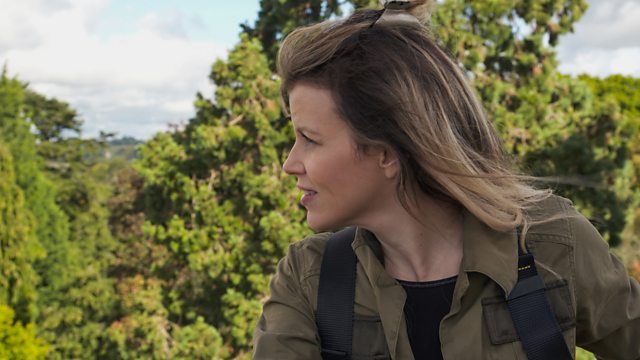
Nature Strikes Back
Thirty years on from the Great Storm of 1987, Ellie Harrison visits Wakehurst Place in West Sussex to learn how it dealt with the devastation.
On 15 October 1987 a storm hit the UK with such force that it brought down millions of trees, created devastation and chaos and tragically killed 18 people. Thirty years on, Ellie visits Wakehurst Place in West Sussex, a 500-acre estate which lost 20,000 trees that night and faced some hard decisions as dawn broke the next day. Ellie meets up with the team that rebuilt and replanted Wakehurst's collection and helped turn it into the showcase for global conservation that it is today.
Ellie also looks back through the Countryfile archive, remembering the stories and places that have also suffered and rebuilt in face some of Britain's wildest weather.
Last on
Music Played
-
![]()
Ghostpoet
12 Deaf (feat. Dave Okumu)
-
![]()
Cicero
Love Is Everywhere
-
![]()
Mint Royale
Singin' In The Rain
The great storm of 1987

On the night of October 15th 1987 a massive storm smashed its way through southern England ripping up town and countryside alike. It’s estimated that fifteen million tees came down that night and sadly 18 people were killed. Wakehurst, the Kew Garden’s country estate bore the full force of it that night, now 30 years on Ellie visits to find out what happened and how the team there dealt with the devastation.
Britain’s ‘Atlantis’

In the Middle Ages, Dunwich was one of the country’s most important trading ports. But after centuries of storms and erosion, nothing but a tiny village and handful of remnants remain. Matt Baker comes to face to face with the brutal force that buried Dunwich beneath the waves when he goes out on the North Sea with University of Southampton’s Professor of Physical Geography, David Sear. Using maps produced from high tech sonar imaging David takes Matt to some of Dunwich’s most significant sites and explains how ‘Britain’s Atlantis’ has fascinated him since childhood.
Spurn wildlife

Anita is on Spurn Point, at the Southern tip of Holderness, visiting the National Nature Reserve with Andy Gibson, from the Yorkshire Wildlife Trust. She discovers how storms recently changed the peninsula into the UK's newest island. Together they look at why it's such an important new wetland habitat for the thousands of wading birds that visit.
Rebuilding Wakehurst

Back at Wakehurst, Ellie gets a birds eye view of the estate today and sees how the hard work of the last thirty years has paid off. After the storm the team at Wakehurst decided to turn the collection into a haven for conservation and have planted trees to represent temperate zones from around the world. Ellie gets a tour of the southern hemisphere without ever having to leave West Sussex!
Farming on the edge

Adam Henson is returning to one of his favourite places - North Ronaldsay in Orkney. But all is not well, as winter storms have devastated the island’s famous sheep dyke. Built in 1832 the dyke was designed to keep the native sheep on the beach. The sheep have now evolved to live solely off seaweed but, with large sections of the dyke now destroyed, the remaining islanders face a huge task to rebuild it and safeguard the future of their sheep.
Monkey puzzle trees

In the Chile zone of Wakehurst, Ellie meets the nursery manager Kate Wenham to help her plant 80 monkey puzzle trees. The team collected the seeds from Chile back in 2009 and now the saplings are ready for planting.
The Rising Sun Country Park

Of course, it's not just nature that can change landscapes, the storm of our industry has altered much of our countryside beyond recognition. Right on the edge of Newcastle-upon-Tyne are 400 acres of special countryside - The Rising Sun Country Park. It is a green phoenix rising on the site of what used to be one of the world’s largest coal mines. The pit closed 40 years ago and in that time the landscape has been transformed. Matt Baker meets Danny Harrison, a former colliery worker who has seen that transformation. He remembers the pit’s heyday and marvels at the green space it has become.
The Millennium Seed Bank

It’s not just above the ground that Wakehurst are working to conserve trees around the world, below the ground they have the Millennium Seed Bank. Ellie gets a tour and in temperatures of -20 Centigrade, discovers the millions of seeds that are kept here. She also gets a lesson in how different seeds are preserved in different ways, some, like our oak, needing liquid nitrogen to keep them safe.
Winter rock fishing

On a rough day, rock fishing is one of the best ways to catch cod on the North Yorkshire coast. Sean Fletcher joins Glen Kilpatrick and a group of hardy fishermen on one of the stormiest days of the year. Despite the weather Sean follows them out to find the best spot and hopes to learn the secrets of their success. One of Glen’s fishing fraternity also happens to work in one of the best fish restaurants in Whitby, so if they can catch some cod, Sean’s been promised a hearty fish supper!
Credits
| Role | Contributor |
|---|---|
| Presenter | Ellie Harrison |
| Executive Producer | William Lyons |
| Series Producer | Joanna Brame |

